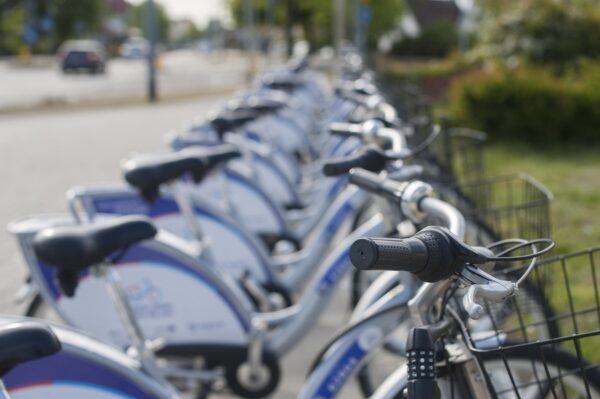Latest Posts

Getting Around Bristol: Transport Tips for Students
Bristol is one of the United Kingdom’s most vibrant student cities – creative, buzzing, and full of energy.
But whether you’re new to the city or returning for another academic year, knowing how to get around can make a big difference to your daily life. With its mix of historic charm and modern convenience, Bristol offers a variety of transport options that suit every student’s lifestyle and budget.
From buses and bikes to walking routes and weekend getaways, here’s your essential guide to navigating Bristol with ease.
Buses: Your Everyday Travel Companion
The bus network in Bristol is a lifeline for many students, especially those living a little further from campus or commuting between university sites.
Operated mostly by First West of England, the bus services cover almost every corner of the city. For students at the University of Bristol or UWE (University of the West of England), there are specific routes that cater to the student population.
Services like the U1 and U2 connect university buildings and halls with key city areas, while other popular routes, such as the 70, 71, 75, and 76, link the city centre with UWE’s Frenchay and Glenside campuses.
Most students opt for a term-time or monthly student bus pass to keep costs down. These can be purchased through the First Bus app, which also allows you to view real-time timetables and journey planners – a real lifesaver on rainy mornings.
What’s more, if you’re only using buses occasionally, there are flexible bundles available to suit part-time travel too.
Walking: A Surprisingly Scenic Option
One of the best things about student life in Bristol is that many of the main areas are comfortably walkable.
If you’re living in areas like Clifton, Redland, Cotham, or even Gloucester Road, chances are your daily journey to lectures or the library can be done on foot. Not only is walking free, but it also gives you a chance to discover the city’s hidden gems – from quirky independent shops to eye-catching street art on every corner.
Walking is also a great way to build up a sense of direction in a new city. That said, it’s worth preparing for Bristol’s infamous hills – especially Park Street and St Michael’s Hill, which can be a challenge if you’re running late or carrying a backpack full of books.
A top tip that will more than likely be useful would be to purchase a good pair of shoes and a lightweight waterproof jacket, as they are highly recommended.
Cycling in the UK’s First Cycling City
Bristol was the first UK city to be officially named a “Cycling City”, and it lives up to that title.
With its growing network of dedicated cycle paths and bike-friendly roads, cycling has become an increasingly popular mode of transport for students. It’s quick, environmentally friendly, and helps you avoid crowded buses during peak times.
If you don’t have your own bike, there are still plenty of options. The YoBike scheme offers affordable cycle hire through a smartphone app, letting you unlock bikes scattered across the city for short trips.
For something more long-term, The Bristol Bike Project refurbishes second-hand bikes at budget-friendly prices – a great way to support local initiatives while getting around affordably.
Make sure to invest in a good lock and always park your bike securely. A helmet and high-visibility accessories are also smart choices, especially during Bristol’s darker, rainier months.
Exploring Further: Trains and Coaches
When you need to travel beyond Bristol – whether it’s heading home for the holidays or planning a weekend adventure – the city’s transport links won’t let you down.
Bristol Temple Meads is the city’s main rail station, offering direct services to London, Cardiff, Birmingham, and many other major destinations. UWE students might also find Bristol Parkway more convenient, particularly for journeys towards the Midlands and North of England.
To make the most of these services, it’s worth investing in a 16–25 Railcard, which gives a third off most train fares. Combine that with booking in advance, and you can travel on a student budget with no problem.
If train prices still feel steep, long-distance coaches like National Express and Megabus offer cheaper alternatives – just be ready for a longer journey.
Budget-Friendly Tips for Everyday Travel
Getting around Bristol doesn’t have to break the bank. The key is to take advantage of student discounts and plan your routes in advance. Most transport services offer student fares, and using apps like First Bus, Trainline, or Voi (for e-scooter hire) can help you track timings and find the best deals.
Traveling during off-peak hours can also save money, especially on trains. Some students also join university or community Facebook groups to share lifts for out-of-town trips, which is not only cost-effective but a great way to meet people.
And of course, walking remains the most reliable and budget-friendly option – no delays, no tickets, no stress.
Making Bristol Yours
Ultimately, the best way to get around Bristol depends on your personal schedule, where you live, and your lifestyle.
Whether you’re cycling to campus in the morning, catching a bus to meet friends in the evening, or strolling back from a late library session, Bristol has a transport option that works for you.
Learning how to navigate the city early on will save you time and money in the long run – and help you make the most of everything this creative and colourful city has to offer. So explore your routes, test your options, and settle into your new rhythm.
Bristol is all yours – go enjoy it.
Read More
Exam Hacks That Students Need to Know Ready for Summer Exam Season
As the academic year reaches its final stages, university students across the United Kingdom are turning their attention to the summer exam season.
For many, this time of year can bring a mix of stress, long study hours, and the pressure to perform. However, with the right preparation and a few clever exam hacks, students can approach this period feeling more organised, confident, and ready to tackle their exams head-on.
Whether you’re in your first year of university or facing your final set of assessments, this guide offers practical advice, helpful techniques, and proven revision methods to help students make the most of their study time and perform at their best when exam day arrives.
When is the Summer Exam Season in 2025?
In the UK, the university summer exam season typically falls between May and June. For 2025, most universities are expected to hold their main summer examinations from early May through to late June.
The exact dates will depend on individual university timetables, which are usually released between February and April.
For students, this means that preparation should ideally begin in earnest around March or April. Leaving revision until the final few weeks often leads to unnecessary stress and poor information retention.
Planning ahead and starting early gives students a significant advantage, allowing plenty of time to revisit challenging topics and build confidence.
Why a Proper Revision Timetable is Essential
One of the most effective ways to tackle exam preparation is by creating a structured revision timetable.
However, it’s important that this is more than just a to-do list of topics. A good revision timetable breaks subjects down into manageable chunks, helps prioritise weaker areas, and ensures that every topic is given enough attention.
Working backwards from exam dates can help in allocating sufficient time for each subject, while building in regular breaks and non-study periods can prevent burnout. Using digital tools like Google Calendar, Notion, or Trello can help students keep their timetable flexible and track their progress along the way.
The Science Behind Active Recall and Spaced Repetition
Two of the most powerful revision techniques are active recall and spaced repetition.
Active recall involves testing yourself repeatedly on the material you’ve learned rather than passively re-reading notes. This might involve writing down everything you know about a topic without looking at your notes or creating flashcards to test your knowledge.
Spaced repetition, on the other hand, involves reviewing information at increasing intervals over time. This method strengthens long-term memory and helps prevent last-minute cramming.
Digital flashcard tools like Anki or Quizlet can help automate this process, making revision more efficient and effective.
Past Papers are Your Best Friend
Past exam papers are often one of the most underused resources available to students. They provide invaluable insight into the types of questions that are likely to appear, how they are structured, and what examiners are looking for in high-scoring answers.
Reading through past papers is important, but going a step further and studying the corresponding mark schemes can provide an extra edge.
Mark schemes highlight key phrases, terminology, and structures that are consistently rewarded. By familiarising yourself with these, you can learn how to write in a way that aligns with examiner expectations.
The Pomodoro Technique: A Smart Way to Stay Focused
One of the most effective methods for maintaining focus during revision is using the Pomodoro Technique, which involves studying in short bursts followed by brief breaks.
Typically, this means working for 25 minutes with full concentration, then taking a 5-minute break, and repeating this cycle several times before having a longer rest.
This approach helps prevent fatigue, keeps your mind fresh, and encourages deep concentration during the 25-minute study periods. It can be particularly helpful when motivation is low or when tackling difficult subjects that require greater mental energy.
Don’t Underestimate the Power of Visual Learning
Many students find that visual learning aids can dramatically improve memory and understanding of complex topics.
Creating mind maps, diagrams, flowcharts, or even visual stories can help cement ideas in the brain more effectively than simply reading or writing notes.
Even drawing cartoons or silly images to represent certain concepts can trigger memory recall during exams. Digital tools like MindMeister or Lucidchart allow students to create these visuals online, but traditional pen and paper work just as well.
Look After Your Health and Wellbeing
No matter how good your revision techniques are, they won’t be as effective if you neglect your physical and mental wellbeing.
During exam season, it’s vital to stay hydrated, eat balanced meals, and aim for consistent sleep routines of 7-8 hours per night. Regular physical activity, even a short walk or light stretching, can also refresh the mind and reduce stress levels.
Students should also be mindful of their mental health. If stress becomes overwhelming, it’s important to talk to friends, family, or seek out student support services. Managing anxiety is a key part of performing well under exam conditions.
Memory Tricks and Mnemonics for Quick Recall
Sometimes, the simplest memory tricks can make all the difference.
Mnemonics, acronyms, rhymes, and chunking information into smaller groups are all time-tested methods for improving recall.
Creating quirky or funny sentences to remember lists or processes can also help, especially in subjects like science, history, or law where detailed information is essential.
Getting Exam Day Ready
When exam day arrives, preparation is just as important as performance.
Packing everything the night before – from stationery to your university ID – can help avoid a morning panic. Eating a slow-energy breakfast, arriving at the exam venue early, and taking a few deep breaths before starting can all help settle nerves.
During the exam itself, reading questions carefully, managing your time effectively, and not dwelling too long on difficult questions are all good strategies for success.
Final Thoughts
Exams will always bring a certain level of pressure, but with the right techniques and preparation, students can approach the summer 2025 exam season feeling confident, focused, and ready to succeed.
Remember, exams are not just a test of knowledge, but also a test of preparation, organisation, and mindset.
Start early, study smart, and most importantly – take care of yourself. Summer success might just be closer than you think.
Read More